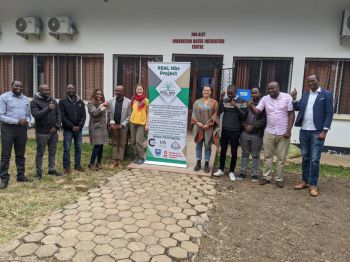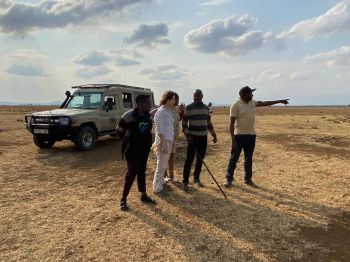Understanding Land Restoration Through Community Engagement: Insights from Monduli District, Tanzania
By: Romi Phoenix
Last updated: Tuesday, 18 November 2025

REAL NbS in Arusha with NM-AIST and Monduli District crew and facilitators

Monduli District Lower village Rotational Grazing site visit
In August 2025, our team travelled to Monduli District, Arusha, Tanzania, where we conducted research aimed at identifying social psychological factors that motivate agro-pastoralist communities to protect their communal land from degradation. This work forms part of our interdisciplinary research initiative, which seeks to understand how nature-based solutions (NbS) can help address land degradation in Eastern Africa while ensuring these approaches are socially equitable, culturally appropriate, and locally grounded.
Alongside the research activities, we met with several NGOs working locally on land restoration and sustainable land management. Through these engagements, we explored how local communities are responding to land degradation and how they can develop solutions that are both environmentally and socially effective.
Collaborating with Monduli District Communities
In three villages of the Monduli district, our team worked closely with the agro-pastoralist communities to understand how they are perceiving and managing land degradation. The workshops that formed part of the research process were facilitated in both Swahili and Maa (the Maasai language) in collaboration with the local project partners: the Nelson Mandela African Institution of Science and Technology (NM-AIST), the Monduli District Council, and the Tanzania Conservation and Community Empowerment Initiative (TACCEI).
During the workshops, participants worked in small groups to explore how land degradation affects communal resources and livelihoods in their villages, how community members support each other in the face of this shared threat, and what actions can be taken in the future. Several social psychological parameters were measured following the workshops, exploring the impacts that the group work had on participant attitudes and motivations. The study has provided a new understanding of the causal impact of the novel group work approaches on a range of psychological processes and intentions to collectively care for the shared land resources.
The team has also visited experimental plots in all three villages, where some co-selected nature-based solutions are being tested by the project. These visits helped us understand how communities engage with and evaluate different restoration techniques, while exposing us to the everyday challenges local people face, including limited resources and financial constraints.
Traditional Knowledge and Resilience
In the lowest-lying village of the district, we learnt how traditional rotational grazing systems are governed by community bylaws that prevent overuse of communal rangelands. Our team is collecting soil and social data to explore how these traditional systems intersect with land health and community motivation, a clear example of how indigenous knowledge and scientific research can complement one another.
In another village, this time one of the highest and greenest parts of Monduli, the community’s commitment to restoration is remarkable despite severe land degradation marked by deep gullies. Collective agreements, such as restrictions on tree-cutting, help maintain grazing areas and pathways. This community-driven stewardship provides important evidence for our study on how social norms and collective action can sustain restoration over time.
In the last village, located between the two, we observed both control and experimental plots used by local partners to test various land management approaches, including agroforestry systems combining coffee trees and bean crops. These examples provided context for understanding how communities implement different NbS options in practice.
Learning from Local NGOs
During the visit, we also met with several Tanzanian NGOs whose work offers rich examples of community-led restoration. Through their practice, these organisations demonstrate how gender equity, local knowledge, and empowerment are central to sustainable outcomes:
- Oikos East Africa empowers pastoralist women to lead restoration projects, combining invasive plant removal with financial literacy and conservation training.
- Pastoral Women’s Council (PWC) advances women’s rights and education while promoting sustainable land management, ensuring that restoration efforts support both gender equality and environmental sustainability.
- Savannas Forever International (SFI) runs a native-seed production programme, where women and youth rehabilitate degraded plots — linking restoration to income generation.
- ECHO East Africa supports smallholder farmers through training in sustainable farming methods and affordable innovations such as solar irrigation, biochar, and biogas, which improve both land health and food security.
These collaborations deepened our understanding of how local communities are already taking the lead in land protection — and how our research could amplify their efforts through evidence-based, socially grounded, and ecologically sound approaches.
Looking Ahead
Our time in Monduli was both inspiring and illuminating. The resilience of the pastoralist communities, together with the expertise of local NGOs, provided invaluable insights into how communities adapt to environmental change and lead restoration from within.
The lessons learned will continue to shape our research, helping us deepen our understanding of how nature-based solutions can strengthen both ecosystems and livelihoods. As we move forward, we remain committed to co-developing knowledge and tools with our partners — supporting long-term, community-driven land restoration across Eastern Africa.
This work is supported by UK Research and Innovation Building a Green Future strategic theme, Building a Secure and Resilient World strategic theme, Natural Environment Research Council, and the Foreign Commonwealth and Development Office (grant number NE/Z503447/1).
Further information: https://www.sussex.ac.uk/research/projects/land-degradation-nature-based-solutions/